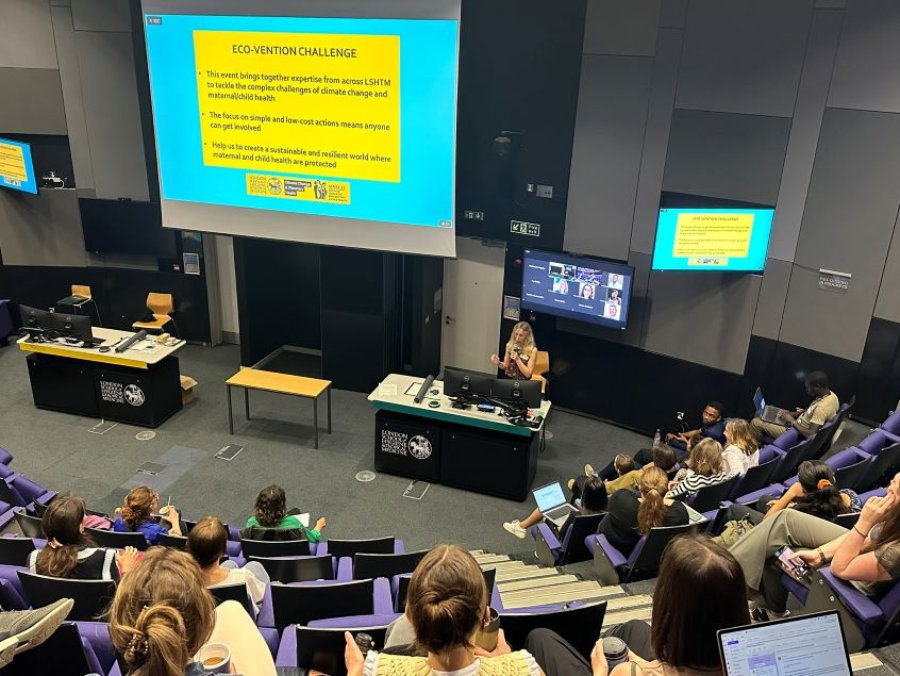
Globally, the effects of climate change on maternal and child health are both direct and indirect. Unfavourable health consequences, such as miscarriage, low birth weight, malnutrition, and respiratory illness, can result from exposure to stressors connected to climate change. It is this premise that inspired the development of the ECO-VENTION challenge. Now more than ever, interdisciplinary collaboration and cooperation are required to address climate and health challenges.
ECO-VENTION was an evidence-based ideation challenge that focused on the development of novel, innovative, actionable and effective health interventions that address maternal, adolescent, reproductive, and child health issues with a climate focus.
Organised by two student liaison officers, Martins Iyekekpolor and Parisa Kabir, with Professor Susannah Mayhew, the MARCH climate theme lead, the event brought teams of staff and students together to collaborate and develop solutions that address key climate challenges. The challenges were based around three focus areas; heat and maternal and perinatal health, extreme climate events on sexual and reproductive health of women and girls, and climate-related mental health among youth.
Leveraging the multi-disciplinary expertise from across MARCH and CCCPH, the challenge opened with presentations from experts in each focus area. Dr Ana Bonell, Professor Susannah Mayhew and Joy Muhia provided an overview of the current problems and potential areas that need addressed, ensuring all teams had the necessary information to support them in developing their solutions.
ECO-VENTION asked teams to use a human-centre design (HCD) process, a technique that puts real people at the centre of the development process, within their solution development. Thomas Schurman, Director of Proportion Global, joined the challenge to present an overview of HCD tools and processes as well as sharing case studies, which created some questions and generated inspiration for the challenge.
The event also welcomed Jasmin Major from Challenge Works, who shared more about the mission of Challenge Works and how they support and nurture innovations such as those the teams were going to be working on.
Following the inspiring and informative morning, teams were prepared to take on the ECO-VENTION Challenge. Throughout the day, teams worked together to format their ideas, outlining their challenge of choice and their potential solution as well as ways to trial and scale their solutions. Each team pitched their ideas to a panel of climate and health experts and colleagues from across LSHTM.
All teams presented interesting, actionable and promising innovations. The judges were impressed with the range of ideas and ways in which teams planned to address some of the key climate-related challenges facing women and children globally. Ultimately, the judging panel voted ‘Blue Sky Solution’ as the winning team for their idea of providing safe and mobile shaded areas to cover workstations in stone quarries for women working in extreme heat in Uganda.
Following the judges’ decision, there was a popular winners vote, decided by the audience, which was awarded to the team ‘EH4CR’ for their solution to train community healthcare workers to provide climate change related counselling for pregnant women in Ghana and Uganda.
Dr Sarah Whitmee, Assistant Professor at LSHTM and member of the ECO-VENTION judging panel, said, “The ECO-VENTION challenge was a sobering reminder of some of the urgent challenges facing women and children around the world in the face of increasing risks from climate change.
“It was inspiring to see the creative solutions proposed by the different teams which showcased the need for planetary health thinking and interdisciplinary collaboration in addressing these pressing issues.”
The remaining teams also presented a range of innovative solutions which could have real impacts for communities across the globe.
- Future Health Defenders – Facilitating local mothers, women with experience of being pregnant and a mother in extreme heat, to become links between the community and healthcare workers to increase access to health services and other interventions.
- Women 4 Women – Create a specialised service to support women experiencing gender-based violence following cyclones and other natural disasters, including sexual and reproductive health services.
- TLSCK - Development of youth hubs to support young people’s mental health in relation to risks of climate change and displacement due to climate change.
Professor Debra Jackson, Takeda Chair in Global Child Health and MARCH Co-Director, said: “This was a fabulous collaborative effort between the students and faculty across both CCCPH and MARCH, showcasing the impacts of climate change on women and children and the enthusiasm to tackle these impacts on health across LSHTM.
“LSHTM is a leader in climate change and health and we must maintain and enhance this expertise to tackle what is possibly the most important issue of our time, to assure a healthy future for the world’s children.”
LSHTM's short courses provide opportunities to study specialised topics across a broad range of public and global health fields. From AMR to vaccines, travel medicine to clinical trials, and modelling to malaria, refresh your skills and join one of our short courses today.
